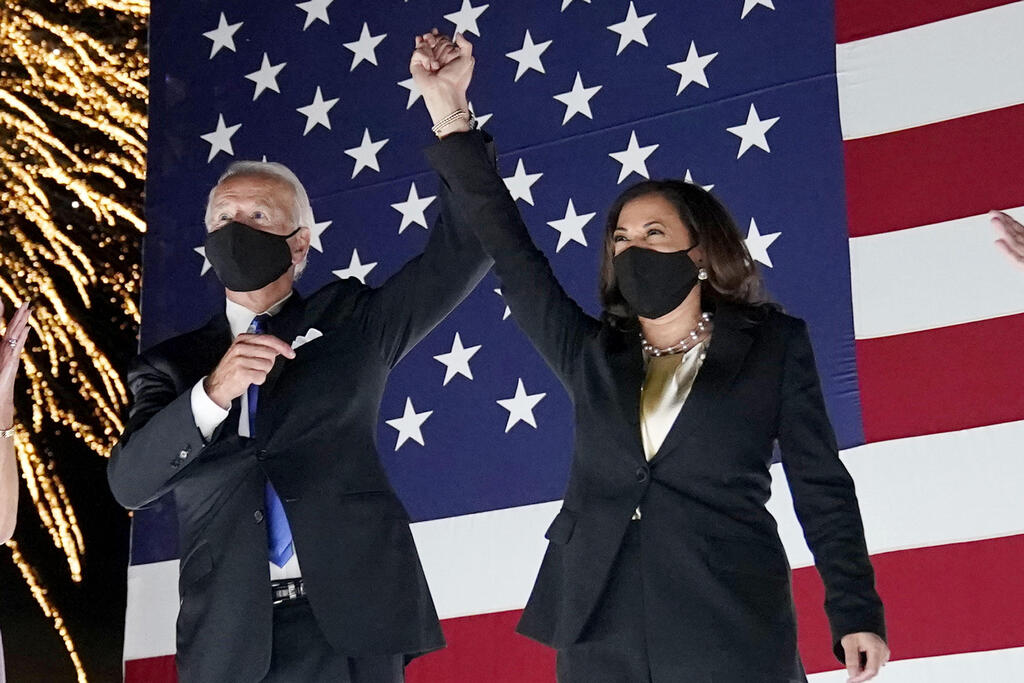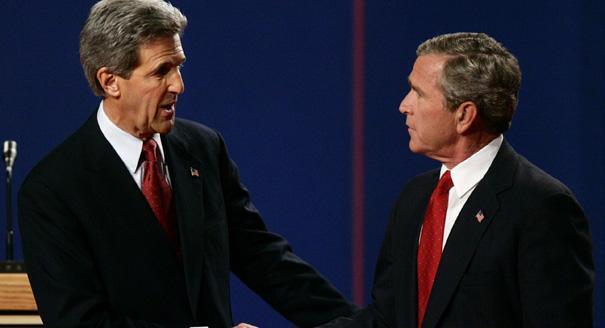Getting your Trinity Audio player ready...
In the run-up to the 2004 U.S. presidential elections, many pundits predicted that Democratic nominee Senator John Kerry would triumph over Republican incumbent George W. Bush.
Bush was seen as a failed president, but that was not the case throughout his first term.
5 View gallery


U.S. President George W. Bush talks to rescue workers in the wreckage of the World Trade Center in New York after the Sept. 11, 2001 attacks
(Photo: Getty Images)
Following the Sept. 11, 2001 attacks, the American and British armies began pummeling Afghanistan's Tora Bora mountains. The patriotic surge that swept the nation made almost everyone forget that Bush nearly lost to Bill Clinton's vice president Al Gore in 2000.
But then came the needless 2003 invasion of Iraq and with it thousands of casualties and an economic collapse.
Experts had already written off Bush as a one-term president, with his opponent, Vietnam veteran John Kerry, seen as a sure bet for the presidency.
Republican strategists estimated that Bush had no chance in large urban areas, so they aimed at rural communities, where poor white voters could prove to be more supportive of him based on their hatred of so-called city elites.
On Election Day, Democrats stayed home in droves, believing the victory was in the bag.
In the end, Bush won with 286 electoral votes to Kerry's 251.
Donald Trump is expecting a similar miracle on November 3, having to deal with a pandemic (which he insists is over), dwindling American status on the world stage and societal and racial tensions unseen in the U.S. since the 1960s.
Like Bush in 2004, Trump is the subject of satire and parody. For example, there is a popular meme currently doing the rounds comparing the president to a Halloween pumpkin: Orange on the outside, hollow on the inside and due to be thrown out in November.
Despite the trauma of the 2016 polls incorrectly predicting Hillary Clinton beating Trump, most (as they did in 2000 with Gore) indicate Joe Biden will easily win the election. But Trump still has massive support from both low-income white voters and white supremacists.
Trump blames China for the sad state of affairs in the U.S., completely ignoring his contribution with his unrestrained isolationism that severed the country from its traditional allies in Europe.
5 View gallery


A white supremacist rally in Charlottesville N.C. in August 2017 that ended in the murder of anti-racist protester Heather Heyer. Trump said there were 'very fine people on both sides'
(Photo: Reuters)
In a week, we will find out if hatred for Trump surpasses the hatred for the elites.
For Israel, a Trump victory would leave things as they pretty much are: Peace treaties with countries with whom we were never at war and a complete diplomatic impasse with our true enemies.
Trump is seen by many as Israel's ultimate friend, but just as he has done in the U.S., he has isolated us from the Western community to which we belong.
5 View gallery


Prime Minister Benjamin Netanyahu and U.S. President Donald Trump at the White House signing ceremony for the Abraham Accords
(Photo: MCT)
A Biden win, however, could provide a reboot for our international standing.
A victory for the former vice president would most likely not lead to a 180-degree reversal on certain issues, such as returning the U.S. embassy to Tel Aviv or conditioning aid on policy shifts regarding the Palestinians and West Bank settlements.
Nonetheless, a Democratic victory could be a serious reality check for Israel.
Over the past four years, we have become addicted to a one-of-a-kind powerful psychedelic called "Trumpion" - and the moment the dealer leaves the White House, Israel will need to enter rehab.
Biden and Kamala Harris are friends of Israel, but they will not bow down to every settler's whim, and the party is already full of people who take a cooler stance on Israel.
Just like Barack Obama and Trump before him, if Biden is elected, he will continue to reduce the U.S. presence on the international stage, but will not abandon it outright.
Last April, Biden wrote that the U.S. must again lead the world, in coordination with its allies.
5 View gallery


Joe Biden and Kamla Harris appear at the 2020 Democratic National Convention after the party officially nominated them as presidential and vice presidential candidates
(Photo: AFP)
His victory would signal the country's return to the Paris Agreement and perhaps the Iran nuclear deal (gradually) and the Palestinian issue.
The U.S. will keep defending Israel at the UN, though not automatically as Trump did.
Also noteworthy are the large swathes of American Jews who are Democratic and who always fought for Israel in the Capitol and the White House.
Will they keep this up under a Biden administration? Maybe.
It's too bad we forgot about them and the important ties we share when we threw out the plan for egalitarian prayer at the Western Wall and turned Israel into a theocratic state.
Barukh Binah is the former Israeli ambassador to Denmark, former deputy head of mission at the Israeli Embassy in Washington, D.C. and the former consul general to the U.S. Midwest


